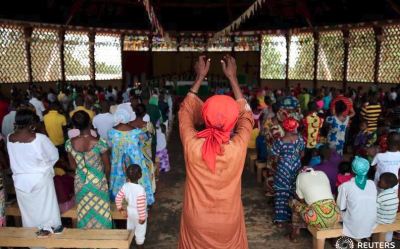False gospels in African churches

Africans before the arrival of Christianity were very religious people. When Christianity came, they embraced it with joy. Originally, Christianity promised personal salvation after death and everyone who came to Christ then was looking forward to life after death. The missionaries who brought the Gospel to Africa abandoned their families, the comfort of their homes, all the luxuries in their home countries and jeopardized their lives to reach Africans with the Gospel and love of Christ.
The first generation of Christians in Africa received the spirit of mission that was passed to them by the early missionaries. In 1857, the Rev. John Christopher Taylor — an Igbo slave who left Sierra Leone for Onitsha in Southeast Nigeria on a missionary journey made a clarion call to all African Christians to come together to ensure that the people of Nsugbe were saved: “Ye enlightened sons of Africa will you leave the 26,000 inhabitants of Nsugbe to perish for lack of bread of life? Ye sons of Africa in general whether born of Sierra Leone or West Indies here are tracks marked out for your usefulness.”
This call was made when the first missionaries arrived in Nigeria, when the biblical Gospel was first preached and believed. The Rev. John Christopher with other volunteers labored amid sufferings, persecutions, and frustrations to bring the people of Nsugbe to the saving knowledge of Christ. This trend of laboring to preach the whole Gospel lasted for centuries with the resultant discipleship of committed and dedicated Christians who denied themselves, carried their crosses, and followed Jesus.
The prosperity gospel later came to Africa from the United States of America and penetrated the Pentecostal and evangelical denominations. It is presently thriving even among the orthodox churches because of its promises that is pleasing and soothing to many African worshipers who are looking for ways of escape from poverty, human degradation, bad governance and corruption. Gordon Fee, a New Testament scholar, described the prosperity gospel as an “insidious disease” that has “very little of the character of the Gospel in it.”
This disease is currently ravaging the African churches due to certain factors. The majority of African worshipers are very poor and need solutions to their problems and the prosperity gospel promises them that God will solve all their problems only if they can give Him some portions of what they have. Worshipers wanting to escape poverty have given lavishly to these churches only to end up poorer in the process. There have been several cases in Nigeria alone of people going to church to request their money back when they saw that all the fake promises they received never came to pass.
There is no doubt that the prosperity gospel is very popular in Africa. Most megachurches in Nigeria are owned by prosperity gospel preachers. The aura, intelligence, eloquence and charisma of these preachers are indisputable, and their arguments appear impregnable. They have succeeded in incorporating the African worldview into their preaching knowing fully well that African religion and tradition agree that the blessings of fertility, abundance and wealth are all signs of supernatural blessing from God. Many of us have embraced it to the detriment of our Christian faith.
The majority of African Christians are now more interested in getting their earthly problems solved than they are in getting their spiritual problems solved by the power of the Gospel.
The Gospel that Western missionaries risked their lives to bring to us is completely different from what many churches are preaching today. How could we claim to share the same goal of those first missionaries when we preach a different gospel to the one they preached? How we got to where we are now is surprising. Our forefathers who embraced Christianity labored steadfastly to preserve the true Gospel and handed it over to us. We can’t betray them, nor the Lord they served.
Oscar Amaechina is the president of Afri-Mission and Evangelism Network, Abuja, Nigeria. His calling is to take the gospel to where no one has neither preached nor heard about Jesus. He is the author of the book Mystery Of The Cross Revealed.





















